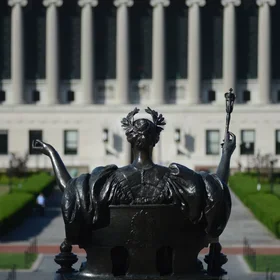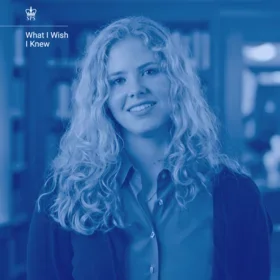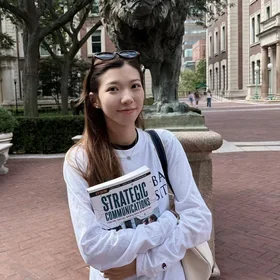Content warning: This article contains references to suicide research.
Sometimes the legal response to conflict isn’t necessarily an end to the conflict.
“Conflict is inevitable in any profession—especially in the legal realm—and often leads to stress and frustration,” says Andrea Garcia, a Columbia SPS CUNY fellow and a student in the M.S. in Negotiation and Conflict Resolution (NECR) program. A recent graduate of Queens College, she earned her bachelor’s degree in political science with a concentration in law and politics and a minor in legal studies.
In a recent conversation with SPS, Garcia explains her current work at SPS focusing on the mental health of Rikers Island inmates and her future plans to apply her conflict resolution skills within the legal field.
Could you please tell us a bit about your personal background and what led you to the M.S. in Negotiation and Conflict Resolution program at Columbia SPS?
I was born and raised in Queens, one of the most diverse counties in the United States. I attended Queens College, majoring in political science and legal studies. I graduated in three years, serving as the commencement speaker for the Class of 2023. The opportunity to join the Columbia SPS CUNY Fellowship program allowed me to pursue a Master of Science in Negotiation and Conflict Resolution.
In the NECR program, I am learning about the root causes of conflict, its emergence between individuals, and effective intervention methods. The right approach can resolve conflict in a way that fosters rapport between parties, rather than damages it. Thanks to the NECR program, I am acquiring the necessary skill set to effectively negotiate and resolve conflicts, in both personal and professional contexts.
Why did you decide to apply to be an SPS CUNY fellow, and what has this opportunity meant to you?
I applied to be a Columbia SPS CUNY fellow because the program offers exceptional academic opportunities and resources that are not easily accessible elsewhere. This opportunity has allowed me to intellectually challenge myself through coursework focused on critical thinking, problem-solving, and leadership.
Additionally, I have had the privilege of connecting with top-tier professionals, faculty, and mentors, which has provided valuable networking opportunities and access to career development resources. The Columbia SPS CUNY Fellowship has been a transformative experience, enabling me to broaden my intellectual and career horizons.
Can you tell us about your specific research/work and interests within the field of negotiation and conflict resolution?
In the Negotiation and Conflict Resolution program, students are required to complete a capstone project on a topic of their choosing. Given my interest in the criminal justice system, I have chosen to focus on suicide among inmates at Rikers Island. This topic is particularly important to me as I seek to understand the conditions within the facility that may drive an inmate to take such a drastic step. The impact is so profound that there have been cases of inmates committing suicide even years after their release. I am eager to explore this issue further and hope to brainstorm potential interventions to prevent or reduce such occurrences.
What are the biggest challenges and opportunities for the field as a whole, and what would you like people to know about the work you do?
The field of conflict resolution faces significant challenges, including the increasing complexity of conflicts, the persistence of violence, and resistance from parties unwilling to negotiate. These challenges are compounded by issues such as political instability, cultural divisions, and limited resources. However, there are also substantial opportunities, including the growing global emphasis on peacebuilding, the potential for technology to facilitate dialogue, and the increasing recognition of the importance of inclusive, local-led approaches to conflict resolution.
As a practitioner in this field, I believe it is crucial for people to understand that conflict resolution requires patience, adaptability, and a deep commitment to understanding the perspectives of all parties involved. Successful resolution often demands long-term efforts that prioritize dialogue, trust-building, and systemic change.
What has been the most impactful lesson from your time in the program or at Columbia in general so far?
The importance of self-awareness. This trait is crucial in any field, as it has helped me understand how I am perceived by others. It has enhanced my communication skills, strengthened working relationships, and reduced misunderstandings and conflicts. Further developing self-awareness has improved my decision-making, intrapersonal and interpersonal relationships, and personal growth. All of which are valuable assets in any professional setting.
What’s next for you after SPS?
Upon graduation from the School of Professional Studies, I plan to pursue a career in the legal field, either as an attorney or a law enforcement professional. Both roles are integral to the judicial process and have the potential to make a meaningful impact on society.
About the Program
Columbia University’s Master of Science in Negotiation and Conflict Resolution prepares students to analyze the root causes and dynamics of conflict and to transform disputes through reasoned and resourceful interventions. The program focuses on developing self-awareness, tenacity, and interpersonal competency; building common ground; opening lines of communication; ensuring representation and recognition; and building sustainable possibilities for resolution.
The fall 2025 application deadline for the M.S. in Negotiation and Conflict Resolution program is May 1. Learn more here.


